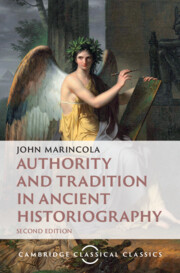Book contents
- Frontmatter
- Contents
- Foreword
- Preface
- Abbreviations
- Introduction to the second edition
- Introduction
- I The Call to History
- II The Historian’s Inquiry
- III The Historian’s Character
- IV The Historian’s Deeds
- V The ‘Lonely’ Historian: Contrast and Continuity
- Conclusion
- Appendices
- Bibliography
- Index locorum
- Index of Greek words
- General index
Introduction
Published online by Cambridge University Press: 31 January 2025
- Frontmatter
- Contents
- Foreword
- Preface
- Abbreviations
- Introduction to the second edition
- Introduction
- I The Call to History
- II The Historian’s Inquiry
- III The Historian’s Character
- IV The Historian’s Deeds
- V The ‘Lonely’ Historian: Contrast and Continuity
- Conclusion
- Appendices
- Bibliography
- Index locorum
- Index of Greek words
- General index
Summary
This book is a study of the explicit attempts by the ancient Greek and Roman historians to claim the authority to narrate the deeds encompassed in their works. The term ’authority’ has many meanings over a range of disciplines, but in this book it is used to refer to literary authority, the rhetorical means by which the ancient historian claims the competence to narrate and explain the past, and simultaneously constructs a persona that the audience will find persuasive and believable. The work is thus a study of certain forms and conventions of persuasion employed by the historians. No attempt is made to evaluate the truth or falsity of historians’ claims; rather, I try to set out the various claims which are part of the construction of the author’s historiographical persona; to see how and why these claims are made; to explain how the tradition of such claims developed; and to show how the tradition moulded the way in which writers claimed historiographical authority.
- Type
- Chapter
- Information
- Authority and Tradition in Ancient Historiography , pp. 1 - 33Publisher: Cambridge University PressPrint publication year: 2025

